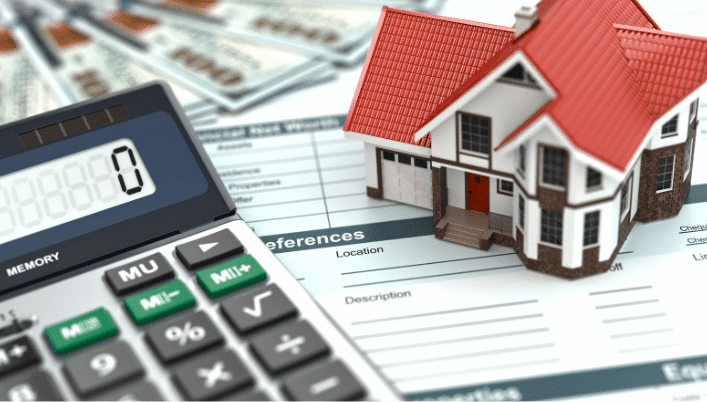
Embark on a journey through the captivating realm of mortgage calculator and homeownership essentials.
Imagine having the power to unravel the complexities of mortgages with just a few keystrokes and introducing the Mortgage Sage – your ultimate guide to deciphering the intricate world of home financing.
Curious about mortgage calculations?
Key Takeaways
- Mortgage Calculator Purpose: A mortgage calculator is an online tool that estimates monthly mortgage payments based on loan amount, interest rate, and repayment period.
- Financial Clarity: Using a mortgage calculator helps borrowers understand their affordability and make informed decisions about borrowing limits.
- Essential Inputs: To use a mortgage calculator, provide details such as loan amount, interest rate, repayment period, property taxes, insurance, and additional costs.
- Monthly Payment Calculation: The calculator uses a formula to compute the exact monthly payment, covering both principal and interest.
- Affordability Assurance: Calculating payments ensures that you don’t take on a mortgage beyond your financial means.
- Risk Management: Accurate estimation helps prevent borrowers from overextending and facing challenges in repaying the mortgage.
- Smart Borrowing: Understanding your potential monthly payments allows you to tailor your home search within your budget.
- Empowerment: A mortgage calculator empowers borrowers to explore different scenarios and find the right mortgage terms.
- Informed Decision: By grasping the mechanics of mortgage calculations, you can confidently make choices aligned with your financial goals.
- Preparation: Knowing how a mortgage calculator works equips you to navigate the home buying process and engage with lenders more effectively.
Understanding the Basics: How a Mortgage Calculator Works

What is a mortgage calculator, and how does it work?
A mortgage calculator is an online tool that allows you to estimate your monthly mortgage payment based on various factors such as the loan amount, interest rate, and repayment period.
It works by taking these inputs and using a mathematical formula to calculate the monthly amount you will need to pay.
Why should you use a mortgage calculator?
Using a mortgage calculator is essential because it can give you a clear understanding of how much you can afford to borrow and your monthly payments.
It helps you make informed financial decisions and ensures you don’t take on a mortgage beyond your means.
What information do you need to use a mortgage calculator?
To use a mortgage calculator, you must know the loan amount, interest rate, and repayment period.
You may also need to provide additional details such as property taxes, homeowners insurance, and any other costs associated with the mortgage.
The Power of Numbers: Calculating Mortgage Payments with Precision

How can a mortgage calculator help you calculate your monthly payment?
A mortgage calculator can help calculate your monthly payment by considering the loan amount, interest rate, and repayment period.
It uses a formula to determine the amount you must pay each month, including principal and interest.
What factors affect your monthly mortgage payment?
Several factors can affect your monthly mortgage payment.
The loan amount and interest rate are two of the most significant factors.
A higher loan amount will result in a higher monthly payment, while a higher interest rate will also increase your monthly income.
How can you use a mortgage calculator to compare different mortgage options?
A mortgage calculator allows you to input different loan amounts, interest rates, and repayment periods to compare various mortgage options.
Doing so lets you determine which option is more affordable and best suits your financial goals.
Key Elements of Your Mortgage: Exploring Loan Amount and Interest Rate

How does the loan amount affect your mortgage payment?
The loan amount directly impacts your mortgage payment.
A higher loan amount will result in a larger monthly payment, while a lower loan amount will result in a smaller monthly payment.
What role does the interest rate play in your mortgage?
The interest rate is a crucial factor in determining your mortgage payment.
A higher interest rate will increase your monthly payment, while a lower interest rate will decrease it.
Securing a favorable interest rate is essential to ensure affordable mortgage payments.
How can you use a mortgage calculator to understand the impact of interest rate changes?
With a mortgage calculator, you can input different interest rates to see how they impact your monthly payment.
This allows you to evaluate the potential savings or additional costs associated with different interest rate scenarios.
Unveiling the Repayment Period: Tailoring Your Mortgage to Your Needs

What is the repayment period for a mortgage?
The repayment period, or the loan term, is the duration you will repay your mortgage.
Standard loan terms are 15, 20, or 30 years.
The repayment period directly affects your monthly payment.
How does the repayment period affect your mortgage payment?
The longer the repayment period, the lower the monthly payment.
However, a more extended repayment period also means paying more in interest over the life of the loan.
On the other hand, a shorter repayment period results in a higher monthly payment but saves you money on interest.
How can you use a mortgage calculator to find the ideal repayment period for your mortgage?
A mortgage calculator allows you to experiment with different loan terms to find the repayment period that aligns with your financial goals.
It helps you balance an affordable monthly payment and minimize the total interest paid.
Unraveling Amortization: Navigating the Path to Full Ownership

What is amortization in a mortgage?
Amortization refers to gradually paying off your mortgage over time through regular payments.
It involves both principal and interest payments to own the property outright eventually.
How does amortization impact your equity in the property?
As you make mortgage payments, your equity in the property increases.
Equity represents the portion of the property you own, growing as you pay down the principal balance through amortization.
How can a mortgage calculator help you track your amortization schedule?
A mortgage calculator can generate an amortization schedule that outlines the principal and interest payments over the life of the loan.
This schedule helps you visualize how your costs contribute to the reduction of the loan balance and the growth of your equity.
Beyond the Basics: The Role of Mortgage Insurance and PMI

Understanding mortgage insurance: What is it and how does it work?
Lenders often require borrowers to purchase mortgage insurance when obtaining a mortgage loan.
This insurance protects the lender if the borrower defaults on the loan.
Mortgage insurance is typically required if the down payment is less than 20% of the home price.
It provides financial security for the lender and allows borrowers with a lower down payment to receive financing for their dream home still.
Demystifying PMI: Why is it required, and how can you get rid of it?
Private Mortgage Insurance (PMI) is a specific type of mortgage insurance required for conventional loans with a down payment of less than 20%.
PMI protects the lender against the risk of default and allows borrowers to access mortgage loans with a lower down payment.
Once the equity in the home reaches 20%, borrowers can request the removal of PMI, which can help reduce their monthly mortgage payments.
Exploring alternatives to mortgage insurance: Are there any options available?
While mortgage insurance is a common requirement for borrowers, alternative options may be available.
Some lenders offer programs such as lender-paid mortgage insurance or piggyback loans, eliminating the need for traditional mortgage insurance.
Exploring these alternatives and understanding the specific requirements and costs associated with each option is essential.
Choosing the Right Lender: Factors to Consider for a Successful Mortgage
The importance of selecting the right lender for your mortgage
Choosing the right lender is a critical step in the mortgage process.
A reputable and reliable lender can provide guidance, support, and competitive loan options that suit your needs.
Researching different lenders, comparing mortgage rates, and reading customer reviews are essential to finding a lender that aligns with your financial goals and offers excellent customer service.
Evaluating loan options: Fixed-rate vs adjustable-rate mortgages
When considering loan options, evaluating whether a fixed-rate or adjustable-rate mortgage is the right choice for you is essential.
A fixed-rate mortgage offers a consistent interest rate throughout the loan term, providing stability and predictable monthly payments.
On the other hand, an adjustable-rate mortgage (ARM) typically starts with a fixed rate for a certain period, then adjusts periodically based on market conditions.
ARMs can offer lower initial rates, but it is essential to consider potential adjustments in the future.
Assessing your creditworthiness: How does your credit history impact your mortgage?
Your credit history is critical in determining your mortgage eligibility and interest rate.
Lenders assess creditworthiness through credit score, debt-to-income ratio, and payment history.
Reviewing your credit report, addressing any inaccuracies, and taking steps to improve your credit score before applying for a mortgage is essential.
A higher credit score can qualify you for more favorable loan terms and potentially lower interest rates.
Making Informed Decisions: Utilizing the Mortgage Calculator to Estimate Costs
Using a mortgage calculator: How does it work, and why is it useful?
A mortgage calculator is a valuable tool that allows borrowers to estimate their monthly mortgage payments based on various factors.
These calculations include the loan amount, interest rate, loan term, and property taxes.
By inputting these details into a mortgage calculator, borrowers can better understand the financial implications of their potential home purchase, evaluate affordability, and make informed decisions.
Determining affordability: Calculating your monthly payments
Calculating your monthly mortgage payments is crucial to determine affordability.
A mortgage calculator considers the loan amount, interest rate, and loan term to estimate your monthly payments.
This enables borrowers to evaluate their financial capacity and ensure the mortgage payments fit their budget.
When calculating affordability, it is essential to consider other expenses, such as property taxes, insurance, and maintenance costs.
Estimating interest savings: The benefits of making extra payments
Making extra payments towards your mortgage can significantly impact the total interest paid over the life of the loan.
You can estimate the interest savings by making additional payments using a mortgage calculator.
This can help you determine if it is financially feasible to make extra payments and reduce the overall cost of your mortgage.
Financial Flexibility: Exploring the Impact of Extra Monthly Payment on Your Mortgage
The concept of extra payments: How can they help you pay off your mortgage faster?
Extra payments refer to making additional principal payments on top of your monthly mortgage payments.
Doing so can pay off your mortgage faster and potentially save thousands of dollars in interest payments.
The extra amount you pay directly reduces the principal balance, allowing you to build home equity acceleratedly.
Understanding the amortization schedule: How does it change with extra payments?
An amortization schedule is a table that illustrates the breakdown of each mortgage payment, showing how much is applied toward the principal and how much goes toward interest.
With extra charges, the amortization schedule shifts, reflecting a faster reduction in the principal balance.
This means that you will reach the loan’s payoff date sooner and save money on interest payments.
Potential drawbacks of making extra payments: Are there any downsides to consider?
While making extra payments can be financially advantageous, there are potential drawbacks.
Firstly, it reduces your liquid cash flow, which may limit your ability to handle unforeseen expenses or invest in other opportunities.
Secondly, depending on your mortgage terms, there may be prepayment penalties or restrictions on the frequency and amount of extra payments.
Reviewing your mortgage agreement and consulting with your lender before making additional payments is essential.
Adapting to Changes: How Adjustable-Rate Mortgages Affect Your Calculations
Explaining adjustable-rate mortgages: How do they differ from fixed-rate mortgages?
An adjustable-rate mortgage (ARM) differs from a fixed-rate mortgage in that the interest rate is not fixed for the entire loan term.
ARMs typically offer a lower initial interest rate for an initial period, which then adjusts periodically based on market conditions.
This can result in lower initial monthly payments, but it also introduces the potential for increased costs in the future.
Calculating monthly payments on an adjustable-rate mortgage: What factors should you consider?
Calculating monthly payments on an adjustable-rate mortgage requires considering several factors.
These include the initial interest rate, the length of the initial fixed-rate period, the adjustment frequency, and the maximum interest rate cap.
By understanding these factors and using a mortgage calculator, borrowers can estimate their monthly payments and evaluate the long-term affordability of an ARM.
Anticipating rate adjustments: How can you prepare for changes in interest rates?
It is essential to be prepared for potential changes in interest rates with an adjustable-rate mortgage.
When calculating affordability and deciding on an ARM, consider the possibility of future interest rate adjustments.
Determine the maximum monthly payment you can afford if the interest rate reaches the cap.
Assess your financial stability and ensure you can handle potential payment increases before choosing an adjustable-rate mortgage.
Building Your Equity: Understanding How Home Equity Impacts Your Mortgage
What is home equity, and how does it affect my mortgage?
A higher home equity percentage lets you borrow at better interest rates and terms.
It also allows you to tap into your equity through a home equity loan or line of credit to finance other expenses.
How can I build equity in my home?
Building equity in your home involves making regular mortgage payments, which gradually reduce the loan balance.
Property appreciation and improvements can also increase your home’s value, thereby boosting your equity.
Does home equity impact my mortgage rate?
Yes, home equity can impact your mortgage rate.
Lenders often offer borrowers with higher home equity percentages lower interest rates as these borrowers are considered less risky.
Long-Term Financial Planning: Predicting Total Interest Paid Over the Housing Loan Term
How can I estimate the total interest paid over the loan term?
You can estimate the total interest paid by using a mortgage calculator.
This tool considers the loan amount, interest rate, and loan term to accurately calculate the interest paid over time.
What factors affect the amount of interest paid on a mortgage?
Several factors influence the interest paid on a mortgage, including the loan amount, interest rate, loan term, and repayment schedule.
Higher loan amounts, longer loan terms, and higher interest rates result in more extraordinary interest expenses.
Are there strategies to minimize interest paid on a mortgage?
To minimize the interest paid on a mortgage, consider making additional principal payments, refinancing to a lower interest rate, or selecting a shorter loan term.
These strategies can significantly reduce the total interest paid over time.
Expert Advice: When to Refinance Your Mortgage Rate for Optimal Savings
What is mortgage refinancing, and when should I consider it?
Mortgage refinancing involves obtaining a new loan to pay off your existing mortgage.
You should consider refinancing if you can secure a lower interest rate, reduce your monthly payments, or shorten your loan term.
It is advisable to consult with a mortgage professional to assess the potential savings.
How can I determine if refinancing will save me money?
A common mortgage professional can help you evaluate the potential savings from refinancing.
By comparing your current mortgage repayments terms with the new loan terms, you can determine if the interest rate difference justifies the refinancing costs.
Are there any risks associated with mortgage refinancing?
While refinancing can provide financial benefits, considering the associated costs, such as loan origination fees and closing costs, is essential.
Additionally, extending the loan term through refinancing may pay more interest over time.
Maximizing Affordability: Using the Mortgage Calculator to Determine Your Budget
How can a mortgage calculator help me determine my budget?
You can estimate your monthly mortgage payments by inputting relevant details into a mortgage calculator, such as the loan amount, interest rate, and loan term.
This allows you to assess whether the payments fit within your budget.
What factors should I consider when using a mortgage calculator?
When using a mortgage calculator, it’s essential to consider additional costs such as property taxes, homeowners insurance, and mortgage insurance.
These factors can significantly impact your overall affordability and should be considered.
Are there any limitations to using a mortgage calculator?
Free Mortgage calculators provide estimates based on the information provided.
Actual mortgage rates, terms, and eligibility criteria may vary.
It is advisable to consult with a mortgage professional to get accurate and personalized information regarding your specific situation.
Beyond the Mortgage Calculator: Exploring Property Tax and Homeowners Insurance
How does property tax impact the cost of homeownership?
Property mortgage tax is an ongoing expense that homeowners must pay.
The amount is based on the property’s assessed value and is used to fund local services and infrastructure.
Property tax rates vary depending on the location and can significantly impact the cost of homeownership.
What is homeowners insurance, and why is it important?
Homeowners insurance provides financial protection against damages to your property and belongings.
It also covers liability in case someone gets injured on your property.
Lenders typically require homeowners insurance as a condition for approving a mortgage loan.
How can I estimate property tax and homeowners insurance costs?
You can estimate property tax costs by researching the local tax rates and applying them to the property’s assessed value.
Homeowners’ insurance costs can be obtained by requesting quotes from insurance providers.
Consulting with a real estate professional can provide valuable insights into these costs.
Conclusion
Diving into the world of mortgages and financial decisions has never been more intriguing.
Imagine effortlessly navigating the intricate landscape of mortgage calculators, understanding the delicate interplay of loan amounts, interest rates, and repayment periods.
With every keystroke, you’ll uncover the hidden secrets behind adjustable-rate mortgages, unravel the mysteries of property taxes and homeowners insurance, and gain mastery over the art of building equity while paying off your mortgage.
But this journey is not just about numbers; it’s about your financial empowerment.
Whether you’re a seasoned homeowner seeking to refinance for optimal savings or a first-time buyer aiming to determine your budget, our expert guide will walk you through each step, ensuring you make informed decisions.
You’ll be armed with the knowledge to decipher amortization schedules, strategize extra payments, and navigate the intricate dance of fixed versus adjustable-rate mortgages.
The power to shape your financial future lies at your fingertips, guided by expert insights that demystify complex concepts.
Frequently Asked Questions
What is a mortgage calculator?
How does a mortgage calculator work?
It can also provide you with an amortization schedule and show you how much interest you will pay over the life of the loan.
Why should I use a mortgage calculator?
It can help you determine how much house you can afford, estimate your monthly payments, and decide whether to pay a fixed or adjustable mortgage.
How can a mortgage calculator help me with my monthly mortgage payments?
This can help you budget your finances and plan for other expenses.
What is the maximum loan amount I can qualify for?
A mortgage calculator can give you an estimate of the maximum loan amount you may be eligible for.
How can a mortgage calculator help me determine how much house I can afford?
Can a mortgage calculator help me with loan repayment?
It can also help you understand how much each payment goes towards interest and principal.
How can I use a mortgage calculator?
Once you have provided all the necessary details, the calculator will generate the estimated monthly mortgage payment and other relevant information.
Can you calculate your mortgage and tell me if I should buy a home or continue renting?
Considering other factors, such as your long-term goals and financial stability, is still essential.
How can a mortgage calculator help me save on interest?
This can help you compare different mortgage options and choose the one that best suits your needs.












